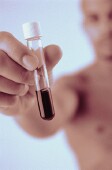- Could Your Grocery Store Meat Be Causing Recurring UTIs?
- Are You Making This Expensive Thermostat Error This Winter?
- Recognizing the Signs of Hypothyroidism
- 10 Strategies to Overcome Insomnia
- Could Artificial Sweeteners Be Aging the Brain Faster?
- Techniques for Soothing Your Nervous System
- Does the Water in Your House Smell Funny? Here’s Why
- Can a Daily Dose of Apple Cider Vinegar Actually Aid Weight Loss?
- 6 Health Beverages That Can Actually Spike Your Blood Sugar
- Treatment Options for Social Anxiety Disorder
FDA Advisors Not Sold on Lifting Ban on Gay Men Giving Blood


Members of a U.S. Food and Drug Administration advisory panel asked the agency on Tuesday to think carefully before repealing a 31-year ban on blood donations from gay and bisexual men.
Their cautious advice doesn’t mesh with the positions of gay rights advocates, medical experts and blood banks, which are all pushing for a removal of the ban. The panel members said their main concern was that it is hard to predict what impact such a change would have on the blood supply, the Associated Press reported.
“It’s going to be a guess as to what’s going to happen,” panel member Dr. James Allen said during the Tuesday meeting. “And it’s going to take time before we get the data that shows us whether that was a good decision or not.”
The FDA is not required to follow the recommendations of its advisers, although it typically does. The agency has not set a deadline for deciding whether to lift the ban, the AP reported.
The FDA first adopted the policy at the dawn of the AIDS crisis. However, changing times and technological advances have rendered the decades-old ban obsolete, according to Glenn Cohen, who directs Harvard Law School’s Petrie-Flom Center for Health Law Policy, Biotechnology & Bioethics. Cohen recently co-authored an article in the Journal of the American Medical Association that called for a lifting of the ban.
“We think it’s time for the FDA to take a serious look at its policy, because it’s out of step with peer countries, it’s out of step with modern medicine, it’s out of step with public opinion, and we feel it may be legally problematic,” Cohen said when the article was published.
The lifetime ban for gay or bisexual men stands in contradiction to other FDA policies regarding people considered high-risk donors due to their sexual behavior, Cohen noted.
For example, there currently is a maximum one-year ban in the United States for blood donations by men who have had sex with an HIV-positive woman or commercial sex workers. The same goes for women who have had sex with HIV-positive men.
By implementing a lifetime ban on donation from sexually active gay or bisexual males, “you’re giving a ‘scarlet letter’ of sorts to these men,” Cohen said.
The policy also stands in stark contrast to recent advances in gay rights, and could be open to a legal challenge, given that the U.S. Supreme Court struck down the Defense of Marriage Act in 2013, he added.
Other countries have already moved to limit their bans on blood donations from gay men in recent years. Canada has changed its policy to a five-year ban, there’s a one-year ban in place in the United Kingdom and a six-month ban in South Africa.
None of these countries has experienced any increase in HIV-positive blood donations, noted Dr. Steven Kleinman, a senior medical advisor to the AABB, an international non-profit blood bank association.
Current technology allows accurate detection of HIV in the bloodstream within weeks of exposure, Kleinman said. Changing the ban to six months or a year remains a conservative approach that still allows officials to prevent contamination of the blood supply, he said.
“It’s correct to say that countries have made changes and so far we haven’t seen any adverse effects,” Kleinman added.
FDA spokeswoman Jennifer Rodriguez has said that the agency is open to changing the lifetime ban.
An advisory committee to the FDA in 2010 voted in favor of retaining the existing policy. But it also found that the ban might be keeping some low-risk donors from contributing to the nation’s blood supply, she noted.
That committee also recommended looking at the results of studies that were undertaken by the U.S. Department of Health and Human Services (HHS). The studies were aimed at reviewing rates of transfusion-transmitted infections and investigating whether another screening strategy for gay men could maintain the safety of the nation’s blood supply.
Since then, an HHS advisory panel has recommended that a 12-month deferral period replace the ban. That would mean men who have had sex with another man in the previous year could not give blood.
However, the panel convened Tuesday was not convinced by the HHS recommendation, according to the AP.
“If I look at the science I would be very wary of a one-year deferral,” said Dr. Susan Leitman. “It sounds to me like we’re talking about policy and civil rights rather than our primary duty, which is transfusion safety.”
The American Red Cross and the AABB both advocate changing the U.S. policy on donations by gay men to a one-year ban — on par with donation policies for other high-risk groups.
But Cohen wants to go further, advocating an “assess-and-test” approach, in which restrictions are placed on potential blood donors based on their personal sexual practices.
Italy adopted such an approach in 2001, and “Italian data suggests there’s no disproportionate increase in the number of HIV-positive donors getting into the blood supply,” he said.
The AABB does not support that approach at this time, although even a one-year ban amounts to a requirement that gay men abstain from sex to be eligible to donate, Kleinman said.
“We’re not requiring anyone else to be abstinent from their sexual partners of choice,” he said, noting that lesbians can donate freely. “But we still find that the risk factor that accounts for the greatest proportion of cases are males who have sex with other males. That’s an epidemiological fact at this point.”
More information
For more on the U.S. policy on blood donations from gay men, visit the U.S. Food and Drug Administration.
Source: HealthDay
Copyright © 2026 HealthDay. All rights reserved.










